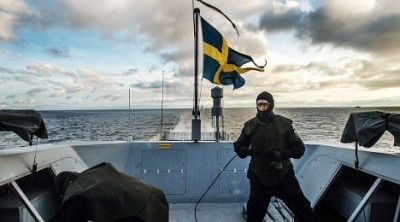Bought Journalism? The “Russian Submarine in Swedish Waters” Story and the Decay of Security Policy Journalism

Sweden ends its search for the unmentionable
This morning the Swedish defence solemnly called off its search for whatever it thought it was searching.
That was what was predicted in TFF PressInfo # 285 two days ago:
”For the above reasons the Swedish military will soon call off the whole thing and the affair will have served its purpose – precisely by not stating what it was, who it was or why it was. Or if it was.
What the purpose of the event may be remains to be revealed at some point in the future. Or perhaps never if – the purpose was fearology for increased militarisation.
Somebody somewhere knows what’s going on. And they put citizens’ security at risk for purposes they would never tell you.”
(No Swedish media showed any interest in this PressInfo).
Admittedly it is difficult – very difficult – to find a smaller object and bring it up in daylight – not to speak of handling the problem that may entail with a foreign country.
But not being able or willing to say a word to the public about what it was leaves behind (together with a couple of farcical mistakes) an impression of incompetence.
Investigate the military’s performance
The Swedish people have right to know and not in a language à la ”probable, credible indications of underwater activity by objects about which we make the preliminary – since investigations are ongoing – judgement that…and that is what the limits of operation secrecy permit us to state at this point.”
Swedish parliamentarians ought to investigate the military’s performance. But there are not enough independent experts, media or politicians in today’s Sweden to mount a broad-minded critical debate.
Instead there will be more money for the military after this.
Only one media interpretation
With few exceptions the media have been reckless in hinting and presuming that this must have been a Russian submarine.
The military, it deserves mention, never did that.
Repeatedly the public was pointed to the aggressive Russia – aggressive, as we all allegedly know, in Georgia and Ukraine.
From left to right, Russia was the likely culprit no matter possible other hypotheses, the longer history and the ‘correlations of force.’
Now to something else – perhaps
This week a highly interesting media story was revealed by a leading German journalist, a former political editor of the Frankfurter Allgemeine Zeitung and an expert on the Middle East. It was hardly seen in the Western mainstream media.
Udo Ulfkotte published a book ”Bought Journalists”. He tells how he himself and colleagues are taught to not tell the public the truth but to deliver stories which are directly or indirectly promoting tension and war as well as promote an anti-Russian and pro-American image to the public.
He also reveals how he was supported by CIA as its ‘non-official cover’ for doing certain jobs – and apologises for it. On video here.
Could one exclude entirely that the Swedish and international media’s translating the unidentified object outside Stockholm without the slightest documentation into ”a submarine presumed to be Russian” is bought journalism?
Indeed, there must be some reason for the remarkable uniformity in finger pointing and omissions of possible alternative interpretations.
Equally relevant speculation
With a little research in the Internet, media and other parties would have found that if there was something out there in the cold waters it could also have been a NATO object.
He is a major source from 12 years ago, the book ”The Secret War Against Sweden: US and British Submarine Deception in the 1980s” by Ola Tunander at PRIO in Oslo.
It was stated by then U.S. defence secretary Caspar Weinberger that:
“NATO” or Western submarines operated regularly in Swedish waters in order to test Swedish defences after US-Swedish Navy-to-Navy consultations. “It was part of a routine regular scheduled series of defense testing that NATO did and indeed had to do to be responsible and liable.” However, according to Weinberger, “at no time, to my knowledge, did NATO simply send a submarine directly into Swedish waters without consultations and prior discussions that that could be done”.
That’s it. Sweden was informed – and accepted – that US/NATO would regularly be present in Swedish waters.
Naturally, a formally neutral country couldn’t say aloud.
Things may have changed since the 1980s of course. But with the increased confrontation thanks to NATO’s expansion and the Ukraine crisis leading to a kind of resumption of Cold War attitudes, this interpretation would indeed be relevant today too.
If this was called off because it was a NATO – routine and regular – operation it would fit a larger pattern of stealth association with the alliance, scrapping both neutrality and non-alignment without involving the Swedish people.
The decay of security policy journalism
During the last 20-30 years the quality of media work and commentary in the fields of security, defence and peace has steadily decreased:
Less professional knowledge, research and independent analysis, less resistance against marketing and SYOPS by the military to boost its legitimacy in the eyes of the paying public; much more uniformity; the disease that journalists interview journalists as if they were experts; and a fierce struggle for sheer survival in the digitalised media world with fewer owners in the business.
One must hope that the majority of the low-grade boulevard coverage of the ”Russian sub in Swedish waters” is not caused by bought journalism, also the bought journalism called self-censorship, political ‘advisory’ by foreign powers and domestic political correctness.
Because they are all incompatible with professional journalism in sovereign democracies. And because its a betrayal of the security of the people.

